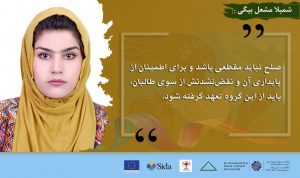We do not want to return to the dark era of Taliban

Afghan women lives have been affected from every aspect during the Taliban’s era making them more concerned than other citizens about the outcome of peace talks.
“Everyone suffered in some way during the dark era of Taliban and war and violence is continuing to be witnessed with their presence. We look forward to end it.” said Ms. Mashal in an interview with CSHRN.
CSHRN: What is the current situation of women in Kapisa?
Mashal Beigi: Although women have made countless commendable progress across the country in the post-Taliban era, I do not suppose enough has been achieved. Women in Kapisa have limited access to their basic rights and only few of them can access their rights and privileges.
CSHRN: What have been the activities of Kapisa civil society with regards to peace?
Mashal Beigi: In the past one to two months, we held about three programs and gatherings on this issue, which were aimed at educating people, especially women. She added that we should use the experiences of other countries with similar transitions to prepare people mentally.
CSHRN: What are the demands of the people of Kapisa for the peace process?
People demand transparent dialogue to discuss unemployment among young generation which is one of the reasons for their joining of the opposite group. Coherence in the structure of the programs of the High Peace Council and the presence of women in decision-making levels are other demands of people, especially women, in Kapisa. According to her to make sure that people, especially women, do not fall victim of peace process, international guarantees are needed.
CSHRN: How do you evaluate the presence of women from Kapisa in various sectors?
Mashal Beigi: Gender discrimination is one of the critical concerns that disables women from going to work in their desired sector. Furthermore, some families oppose their daughter’s education and work. Apart from that, the presence of women in high-ranking government positions has been ignored and women mainly operate in the health and education sectors. We encourage women not to be restricted working in low-ranking government positions. We also persuade them to advocate for their rights and those of other women in civil societies to reduce violence.
CSHRN: What threats do working women face?
Mashal Beigi: Due to the existence of diverging views with respect to women and their occupation coupled with various opposition groups in Kapisa province, we are constantly threatened. However, we will not retreat and hope that with the establishment of peace violence will end. Needless to say that preserving the achievements of the people in recent years should be one of the main conditions of the peace agreement. According to her , the peace deal should not be impermanent and Taliban should make a commitment to ensure its stability is not violated.